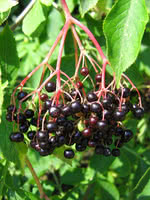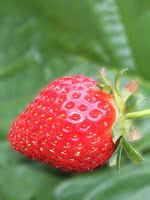Mon-Fri 9am - 5pm Mountain time
Black Elderberry vs Kent Strawberry
Sambucus canadensis
Fragaria ananassa Kent
NOT AVAILABLE THIS SEASON - MIGHT RETURN
Black Elderberry is a deciduous shrub native to eastern North America. You can plant this shrub in moist areas and it will help stabilize your soil. You can also use it on rural properties anywhere you'd use a lilac.
Black Elderberries are considered to be partially self-pollinating. So while they will still produce some berries without cross-pollination, planting with another variety will increase yields. Consider planting with Ranch Elderberry or Bob Gordon Elderberry.
Warning: the seeds, stems, leaves, roots, and uncooked berries of the Black Elderberry are poisonous to humans when eaten in quantity. You should cook the berries to make them safe for human consumption.
Kent Strawberry is a favourite of urban gardeners and commercial growers. This June Bearing (Short Day) strawberry grows well on the prairies and produces high yields of bright red fruit that bursts with flavour. Great for fresh eating or try them in your next batch of jam or baking.
One of the most cold hardy strawberries!
Black Elderberry Quick Facts
Kent Strawberry Quick Facts
Toxicity: leaves, stems, and uncooked berries are poisonous to humans

